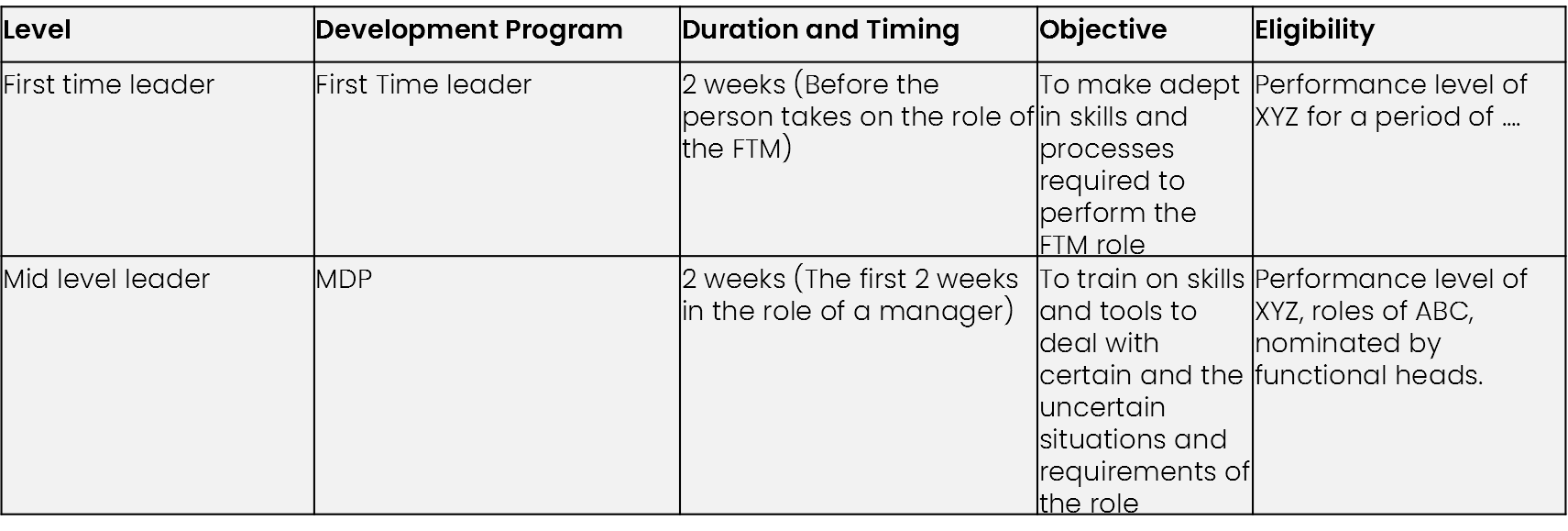“A CEO’s performance is as good as their middle managers”
– Med Jones
In organizations, if any endeavor has attained the peak of platitudes in concept and in deployment, it must be the “Management Development Programs”! MDPs for the last 2 decades have vacillated between
being relegated to, “routine, unexceptional, run of the mill, no value add interventions” or
being elevated to, “glamorous leadership behaviors related, exotic and trying to add value that is not needed at that level.”
This vacillation, given the fact that “it’s the middle that is responsible for ensuring that the brain and the legs move in the same direction”, is a rather risky reality that most organizations have made peace with.
Not surprisingly then, this reality has led to two types of middle management –
- One that is frozen, not moving itself and refusing to let anything else move and
- the second that is moving briskly in all directions or is directionless.
So, what went wrong? Or what needs to be set right? The architects of management development programs– the L&D professionals and development consulting firms, lost track of the fundamentals – the WHY and WHAT of management development.
The simple answers:
Why Management Development Programs (MDPs)?
- To make effective middle managers at what is required of middle managers, i.e. to manage resources and achieve day to day operational excellence in line with the organization’s goals.
WHAT should MDPs therefore comprise?
- To learn the skills of managing – people/ stakeholders and resources in line with the plans. Resource allocation, quality and time related Goals.
- To know the skill and the process required for the deliverables.
- To understand their role as providers of enabling and empowering moments of truth to their teams.
- Not to work as an IC or chase the “glamorous leadership behaviors.”
Some drivers of Management Development Programs that got lost, while organizations, either gave up on it or had misplaced focus on making it “unique and differentiated” and not focused on making Mid managers effective at their roles.
The drivers are simple:
- Management Development Programs are non-negotiable and meant to enhance effectiveness of managers in their current roles. They cannot be the flavor of the year, or the fancy of a new L&D head, or an initiative meant to help an organization achieve a “best places to work with” award or meant to keep an organization of trainers employed.
- An MDP must be part of the first core set of processes set in place, for an organization. An essential not a desirable.
- Any employee who does not meet the criterion for being part of an MDP and hence does not go through the MDP cannot become a manager.
- Management Development Programs must be interwoven with the processes, technology and tools that the managers are supposed to use as part of their roles. Any skill development program that does not dovetail the skills of coaching, goal deployment, commercial acumen, sales management, motivation through incentive management etc with the processes and tools is at best lip service and a waste of precious time and money resources. When we have designed MDPs with our clients (from DTH, Banks, Farm machinery, IT) which have included practice of the skills with relevant processes – the clients have documented business impact. It must be contextualised to the role.
- Timing: An MDP must be delivered before or as soon as a person moves into the role of the manager. An MDP is meant to prepare a manager for the role not to be provided as when “scheduling” allows it.
- Married to Growth: A manager who has not undergone an MDP or has not performed well in an MDP, will see the impact of that in the performance ratings and therefore the growth.
- Responsibility: An MDP is the organization’s responsibility to provide to all aspirant managers and it is incumbent on all aspirants to own it. It cannot be made hostage to “whims and fancies of the learners”, “our people don’t have the time”, “Our people want it to be entertaining”, “if they are not engaged, they won’t do it”, “nothing happens in our culture without follow-up.”
A successfully completed Management Development Program is proof of a person’s merit, inclination and hence their right to promotion and growth, it is a developmental tool not a source of entertainment or a perquisite.
One organization, world-over, that espouses the core purpose of middle managers’ development, is the armed forces. The armed forces have followed the fundamentals doggedly, implemented the development plans with precision. The process has created battle ready able commanders at the mid-levels ready to move to higher levels on strong fundamentals. As an example, the professional development for managerial roles could have a blueprint like:
Finally, the spirit and purpose of the Management Development Programs must be laid out and led by the leaders and it has to sought after and worked for by the mid-level managers. Once the objective is clear the design elements can be brought in to play – senior managers within the company as instructors, blended part of the development, projects to be completed within the first 3 months of being a manager, actual case situations from the company.
According to Jonathan Byrens, the single most important thing a CEO can do to maximize the company’s performance, is to build the capabilities of the company’s middle management team.
He says,”Regardless of what high-potential initiative the CEO chooses for the company, the middle management team’s performance will determine whether it is a success or failure. And if the middle management team is performing in high gear, the managers themselves will generate the right initiatives, and constantly adapt and improve them during implementation.”
References –
- Middle Management Excellence from the publication Working Knowledge, 2005 – Jonathan L.S. Byrnes, Professor at MIT.
- “The army’s approach to leader development”, Command and General Staff college Foundation Inc., Jeffery La Moe and Ted Stricker.
- Med Jones, President, International Institute of Management, a US think tank for financial, economics and business matters.








